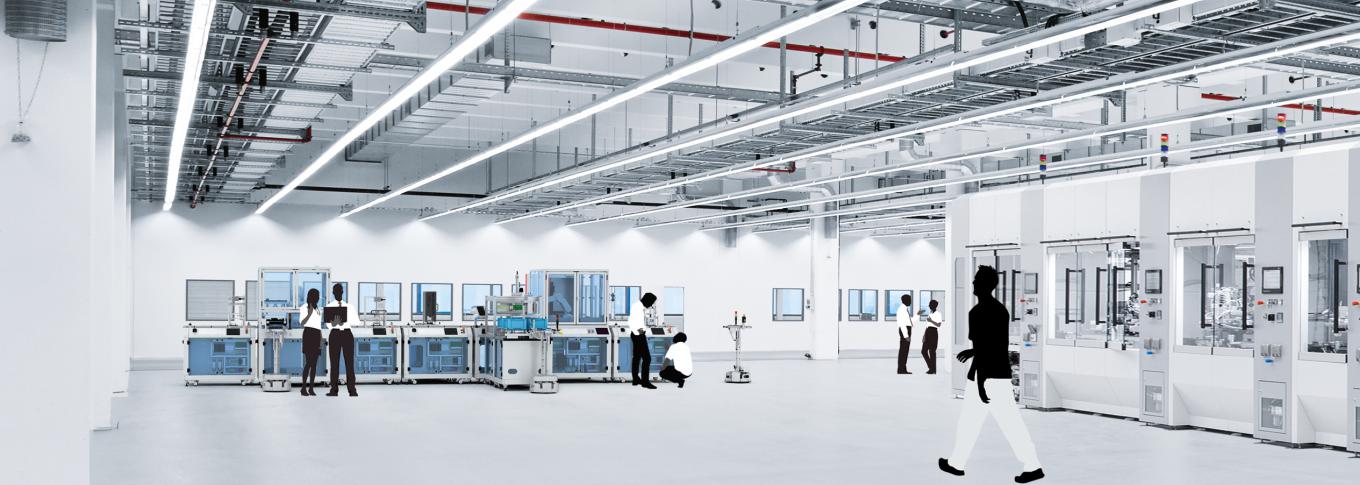
Industry 4.0 – Consequences for Education and Further Education
The enormous rise in the quantity of data and in the complexity of plant networks and company divisions makes it necessary to develop products that make the flow of data easy to project and to use – at production level, but also for training and developing workers’ skills.
For the operation and ongoing optimization of facilities, to maximize adaptability, and to develop flexible, intelligent components, one needs to communicate both a general understanding of digital, fully automated production technologies and in-depth knowledge of the structure and programming of digital facility networks.
Festo takes a holistic approach: The company’s international customers receive the newest networked automation technology with a maximum level of flexibility, safety and speed of delivery as well as full consultation and qualification services for “lean and digital production.” These services are modular in structure: The practical training in the use of new technologies is conducted using the cyber-physical research and learning platform “CP Factory”. The platform replicates the workstations of a real production facility and makes it possible to learn how to program facilities, set up networks and optimize many other aspects such as energy-efficiency and data management. In addition, the CP Factory can also be used to develop and test flexible software solutions prior to their implementation in practice in the production facility.
Learning factory
Staff training in learning factories increasingly requires a highly-flexible, work-integrated approach that relates to production needs and can be easily adapted to changing conditions. The subjects and skills taught need to be intuitive to learn and easy to share to facilitate networked learning.
The CP Factory is part of a so-called learning factory – a modular learning environment that can be used to qualify personnel in the operation of a particular production process or in a particular field of work, such as production technology. Different qualification modules can be added to the CP Factory: process-oriented training in the fields of mechatronics, logistics and process optimization as well as organizational and skills training in aspects such as interdisciplinary collaboration, learning capacity and adaptability.
In so-called “One-Point Lessons” skilled workers and management staff are trained at frequent intervals by internal or external experts in practical aspects of current requirements – for example in the fields of energy management, process optimization, IT management or in the training of skilled staff themselves.
Competency management
To strategically develop staff competencies in line with a company’s development strategy, and to exploit and develop these further for the future, it is important to know which competencies are relevant. The following questions play a key role in the development of a competency management system:
- Which competencies does a company need to reach its development goals?
- What role do managerial staff play in achieving them?
- Which functions and roles apply to the respective job descriptions?
- At what level of competence are the staff in their role? What would a 360-degree feedback look like?
- Competency development as a managerial instrument – what does that mean for me as a manager?
- Which didactic, theoretical and practical modules need to be applied to help promote staff in their self-development?
As an outsourcing partner to industrial companies and organisations, Festo Didactic offers solutions that are standardised and scalable worldwide, based on qualification requirement analyses, and tailored to a company’s needs or specific job profiles. From initial training and specialist, production-related advanced training to the development of training programmes and even turnkey learning centres, companies are able to purchase solution packages from Festo Didactic at their international production site and receive services in line with the latest education standards and technology.
The range of consulting services offered by Festo Didactic is developed in partnership with the technology factories in the Festo Group and include the strategic development of skills at industrial companies, lean management and process optimisation, as well as the integrated planning of factory areas. When it comes to planning and optimising processes, crucial factors are developing target value streams, deducing fields of activity and qualifying employees in a targeted manner. Particular attention is paid to corporate culture-related barriers to change, as every technical and logistical change process requires the individual and well-coordinated involvement of the employees.
Festo is a global player and an independent family-owned company with headquarters in Esslingen am Neckar, Germany. Festo has set standards in industrial automation technology and technical education ever since its establishment, thereby making a contribution to sustainable development of the environment, the economy and society. The company supplies pneumatic and electrical automation technology to 300,000 customers of factory and process automation in over 35 industries. Digitalization, AI and the LifeTech sector with medical technology and laboratory automation are becoming increasingly important. The products and services are available in 176 countries. With about 20,600 employees in over 250 branch offices in around 60 countries worldwide, Festo achieved a turnover of around €3.45 billion in 2024. More than 8% of this turnover is invested in research and development. In this learning company, 1.5 % of turnover is invested in basic and further training. Festo Didactic SE is a leading provider of technical education and training and offers its customers worldwide comprehensive digital and physical learning solutions in the industrial environment.

